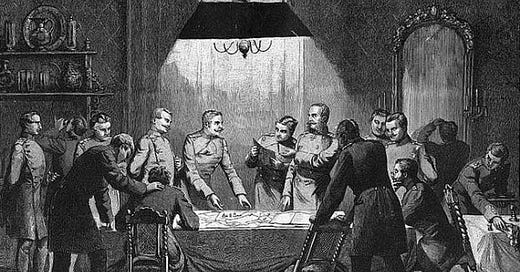If I had to sum up everything I came to realize about roleplaying games in 2023 in one sentence, I would say the following; most people think roleplaying games are something they’re not. Roleplaying games are war games at a small scale and the ultimate goal is to grow an individual unit in power and influence so that they can field and control armies. They are kingdom and warfare simulators set within worlds where magic and monsters exist. Roleplaying games are games, but they are a different animal from video games or board games. Interfacing with the game requires a degree of focus and dedication that other games do not require. Roleplaying games are also social in nature and require a group of people participating and cooperating to play. Most people do not understand these things however, and it is a lack of understanding that prevents people from really achieving the telos of RPGs. That’s what we’ll be discussing today. How do we correctly think about roleplaying games? What is the appropriate headspace for understanding them?
Firstly, we have to understand that RPGs are games first and foremost. This means that they have an objective and a series of restrictions on action that act as a framework. We call this restrictive framework the rules and they are vital to every kind of game. There’s no getting around this. Games live and die by their rules and thoughtlessly removing them is akin to knocking down walls in your house without checking to see if they’re load-bearing. In the same way that you can’t just delete files from a video game’s directory and expect the game to launch and work correctly, you can’t just eliminate rules from a roleplaying game without replacing them with something of equal strength. People understand this in other games, but for some reason RPGs are treated as some kind of exception. This is wrong and, truth be told, a stupid mindset to have. Why would this game be any different from any other game? The rules are your structure. Treat it that way or face a game that cannot hold up to stress.
Secondly, we must understand that RPGs are inherently a social activity. They rely on prosocial interaction between individuals. You need a group and you need to be an active part of the group. You have to be present and ready to participate in the game. You also can’t treat your RPG group the way you treat a video game in your collection. You can play a video game for a while, quit playing it and then come back to it later and either restart or pick up where you left off. You can’t do that with an RPG. It’s not on-demand entertainment like a video game. It involves real people and when you treat those people like they are on-demand entertainment, they won’t be inclined to invite you back to the game. Instead, they will find someone who wants to be a part of the game. You’re making a commitment when you agree to play these games, so honor that commitment. Be a reliable person who does what they say they will and shows up when they say they’ll show up. Treat your group members well and don’t stir up drama. Be the kind of person people want to be around.
Lastly, RPGs require focus and commitment. We’ve touched on the commitment aspect already, but it bears repeating. Don’t be the guy who never shows up. Don’t treat the game as your last priority. Other people treat this game like it’s important, so do likewise. They’re counting on you to be there. The focus aspect though is also extremely important. You have to be present at the table during the game. Don’t be on your phone and don’t break the flow of the game with side conversations or constant jokes. While you’re playing, make the game your primary focus. People treat this like it’s a huge ask, but it isn’t. In many ways, it’s freeing. There are a lot of demands on people’s attention. An overwhelming majority of these demands are artificial. Let them go for a few hours and enjoy the game and the people you’re playing it with. Don’t put a movie or ballgame on in the background. Enjoy the present activity and company.
There is another aspect to focus that's important to understand though. If you really want to play the game well, you need to focus on perfecting it. You must become familiar with the rules. You need to understand the basics well enough to execute them without thinking about it and know your rulebooks well enough to reference the situational rules. This requires reading and studying the rules after game hours. Many balk at the idea of doing this, but answer this for me; if your hobby was playing guitar, would you only touch your guitar when you're playing in front of an audience? Of course not. You take time to practice. You learn your chords, your scales, your picking patterns, etc. You learn songs, you play with a metronome to learn rhythm. You play seated and standing to get a feel for both. Now, why shouldn't you give the same consideration to your hobby of RPGs? Why shouldn't you hone your craft? The answer is that you've never thought about RPGs this way. Well, now you have. Now go do something about it.
RPGs are social games that take dedication and practice to master. This is the most needlessly controversial thing to assert and yet some people will be irate that I've asserted it. The fact of the matter is that we've been thinking about the hobby wrong longer than we've ever thought about it right. It's time to change that. If I do nothing else, I hope I convince you to think of the hobby in this way.




